Lab Members
Dax A. Hoffman, PhD
Senior Investigator

Dr. Dax Hoffman received his B.S. in Genetics from the University of Minnesota in 1994 and his Ph.D. from Baylor College of Medicine in 1999, where he studied dendritic K+ channels with Dr. Dan Johnston. During a postdoctoral fellowship with Dr. Bert Sakmann at the Max Planck Institute for Medical Research in Heidelberg Germany, he investigated synaptic plasticity and Ca2+ signaling in transgenic and gene-targeted mice. Dr. Hoffman became head of the Molecular Neurophysiology and Biophysics Unit, NICHD in 2002. His laboratory explores dendritic signal processing in CA1 pyramidal neurons of the hippocampus.
Email: hoffmand@mail.nih.gov
Jiahua Hu, PhD
Staff Scientist

Jiahua earned his PhD in Cell Biology from Shanghai Institutes for Biological Sciences, CAS in 2003, where he studied the role of GABA transporters in learning and memory and neurological diseases. After his PhD, Jiahua joined the laboratory of Dr. Paul Worley at The Solomon H. Snyder Department of Neuroscience in Johns Hopkins School of Medicine, where he continued to study the mechanisms of neuronal plasticity. Jiahua was then recruited to the NIH in February of 2014 as a Staff Scientist. He is interested in dynamic regulations of synaptic ion channels and metabotropic receptors implicated in neuronal plasticity, excitability and psychiatric disorders with a combination of techniques including Tandem affinity purification-mass spectrometry, biochemistry, imaging and behavior. Jiahua was awarded NARSAD Young Investigator Grant in 2014-2015.
Email: jia-hua.hu@nih.gov
Hu Publications
Lin Lin, MD
Biochemist
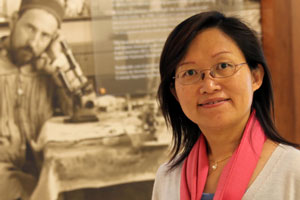
Lin obtained her MD degree at Tianjin Medical University. Afterward, before joining the Hoffman lab, Lin’s research focused on the trafficking and function of nicotinic receptors in CNS in Dr. Anand’s lab at LSUHSC, New Orleans. Then she moved to the NIH (the best place for research), to study the mechanisms behind transmembrane agrin regulation of dendritic filopodia and synapse formation in hippocampal neurons in Dr. Daniels lab. In the Hoffman lab, Lin’s current research focuses on the A-type K+ channels subunit Kv4.2 complex, including its auxiliary subunits (KChIPs and DPP6) which are important for its trafficking and neuronal excitability. The DPP6 gene has been associated with a number of human CNS disorders including ASDs and schizophrenia. Lin discovered a novel role for DPP6 in the regulation of dendritic morphogenesis, impacting hippocampal synapse formation and development.
Email: linl@mail.nih.gov
Lin Publications
Ying Liu, MD
Biologist
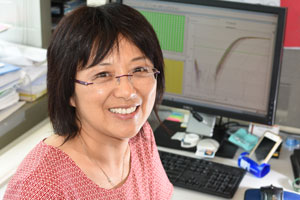
Ying received her MD in 1984 at Shanghai Medical University (current name Shanghai Medical College at Fudan University) where she also obtained her MS degree. She studied Pathobiology at University of Connecticut and obtained her MS in 1994. She did extensive research on molecular regulation of nuclear hormone receptors from 1994-1997 at Brigham and Women’s Hospital, Harvard Medical School. She worked at NIDDK and NICHD doing endocrine research on thyroid hormone receptors and CRH regulation from 1997-2013. After joined Dr. Hoffman’s lab, Ying’s current research focuses on the roles of A-type K+ channels subunit Kv4.2 with other ion channels in neuronal plasticity and excitability.
Email: yingl@mail.nih.gov
Liu Publications
Postdoctoral Research Fellows
Meghyn Welch, PhD
Postdoctoral Research Fellow
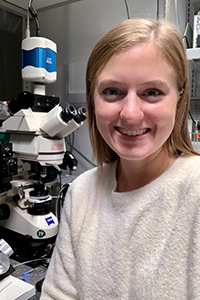
Meghyn received her bachelor’s degree in Biochemistry and Molecular Biology at Mercer University. She completed her PhD at Georgia State University in 2021 in Dr. Deborah Baro’s lab. In the Baro lab, Meghyn found Kv4.2 channels are post-translationally SUMOylated and characterized effects of Kv4.2 SUMOylation on channel expression and gating. Meghyn joined the Hoffman lab in August 2021, where she is using patch clamp electrophysiology to study activity-dependent mechanisms that regulate Kv4.2 function and expression in the hippocampus.
Email: meghyn.welch@nih.gov
Kailey Jerome, BS
Postbaccalaureate Fellow
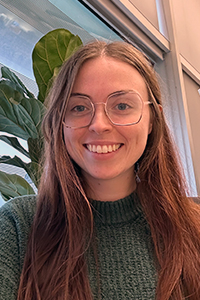
Kailey earned a bachelor’s degree in biology and psychology from the University of North Dakota in 2022. As an undergraduate student, she studied the impact of visual deficits on cognitive fatigue and task performance, retinal regeneration in zebrafish, and SARS-CoV-2 Spike protein in human epithelial tissue. She remained at the University of North Dakota as a Laboratory Technician studying neuroimmune reactions during neurodegeneration using a rodent model. Kailey joined the Hoffman lab in 2024. She is interested in utilizing in vivo and behavioral techniques to study plasticity, learning, and memory.
PhD Students
Ashley Pratt, BS
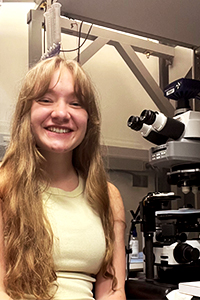
Ashley received her Bachelor’s degree in Neuroscience from Bates College, where she studied respiratory control, and then memory consolidation, as a research assistant. Ashley is currently pursuing her PhD in Neuroscience through the Brown University - NIH Graduate Partnership Program. She is interested in using electrophysiology and other methods to study dendritic integration, plasticity and excitability.
 BACK TO TOP
BACK TO TOP